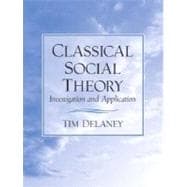
Note: Supplemental materials are not guaranteed with Rental or Used book purchases.
Purchase Benefits
What is included with this book?
Dr. Tim Delaney, Assistant Professor of Sociology at the State University of New York at Oswego, holds a B.S. degree in sociology from the State University of New York at Brockport, an M.A. degree in sociology from California State University, Dominguez Hills, and a Ph.D. in sociology from the University of Nevada, Las Vegas.
Delaney is the author of Community, Sport and Leisure, Second Edition (2001); co-editor of Values, Society and Evolution (2002); and co-editor of Philosophical and Sociological Implications of Deviant Behavior (2003). He has published nearly forty book reviews, numerous book 1thapters, journal and encyclopedia articles, and served as Guest Editor for Philosophy Now. Delaney is an international author.
Dr. Delaney has presented thirty papers at regional, national, and international conferences, including papers that were presented for the Russian Academy of Sciences during international conferences at both St. Petersburg (1999) and Moscow (2001). He is the Associate Founder of The Anthropology Society (Western New York) and is in the process of creating the Social Theory Society, an academic society that promotes "learning through thinking and experience." Delaney maintains membership in ten professional associations, including the American Sociological Association, Pacific Sociological Association, and the North American Society for the Sociology of Sport. In 2002, he was selected as a charter member to the "Wall of Tolerance" sponsored by the National Campaign for Tolerance, co-chaired by Rosa Parks and Morris Dees, in recognition of his community activism and scholarship efforts in the fight against social injustice. Delaney has also been selected for inclusion in the 2003 Marquis Who's Who in America for his outstanding achievements.
| Antecedents: Social, Political, and Philosophical | |
| Auguste Comte | |
| Herbert Spencer | |
| Karl Marx | |
| Emile Durkheim | |
| Georg Simmel | |
| Max Weber | |
| Charles Cooley | |
| George Herbert Mead | |
| Thorstein Veblen | |
| Karl Mannheim | |
| Talcott Parsons | |
| George Homans | |
| Contributions from Women to Classical Social Theory | |
| Bibliography | |
| Index | |
| Table of Contents provided by Publisher. All Rights Reserved. |
The New copy of this book will include any supplemental materials advertised. Please check the title of the book to determine if it should include any access cards, study guides, lab manuals, CDs, etc.
The Used, Rental and eBook copies of this book are not guaranteed to include any supplemental materials. Typically, only the book itself is included. This is true even if the title states it includes any access cards, study guides, lab manuals, CDs, etc.